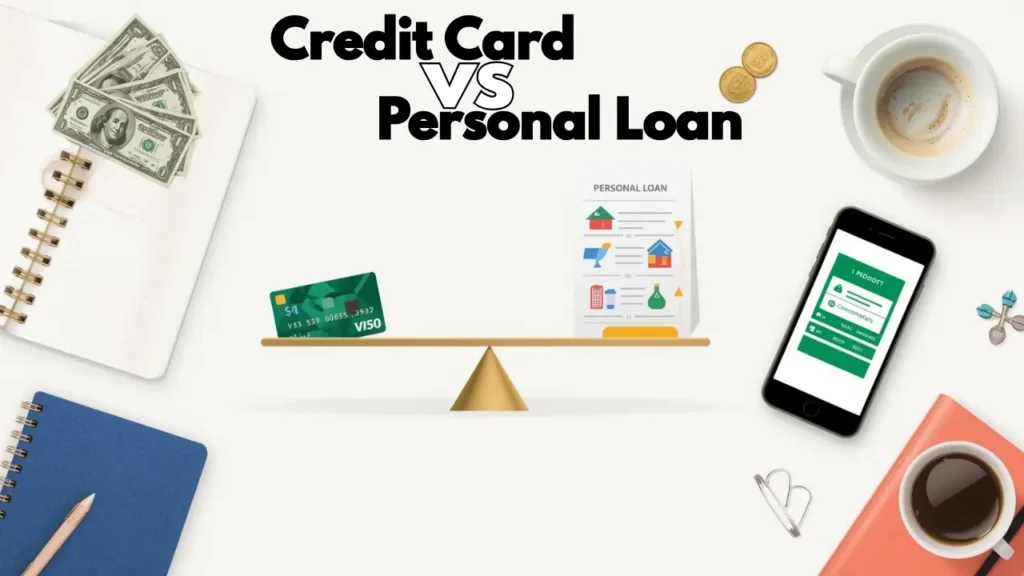When you need extra money, both personal loans and credit cards can be handy financial tools. But which one is the better choice depends on your unique situation, spending habits, and financial goals. This guide will help you understand the key differences, benefits, and drawbacks of each option—so you can decide which suits your needs best.
What Are Personal Loans and Credit Cards?
Personal Loans
- A personal loan gives you a lump sum of money upfront.
- You repay it in fixed monthly installments over a set period (usually 1 to 7 years).
- Interest rates are often fixed, making your repayment amounts predictable.
- Ideal for larger, one-time expenses such as home renovations, medical bills, or debt consolidation.
Credit Cards
- A credit card provides a revolving line of credit with a set limit that you can use repeatedly.
- You make at least a minimum monthly payment on your balance, but ideally pay in full to avoid interest.
- Interest rates are typically variable and can be higher than personal loans.
- Best suited for smaller, everyday purchases like groceries, gas, or emergencies.
Key Differences Between Personal Loans and Credit Cards
| Feature | Personal Loan | Credit Card |
| Access to Funds | Lump sum upfront | Revolving line of credit |
| Repayment | Fixed monthly installments | Variable minimum payments based on balance |
| Interest Rates | Usually lower and fixed | Usually higher and variable |
| Fees | Establishment fees, sometimes prepayment penalties | Annual fees, late fees, cash advance fees |
| Best For | Large one-time expenses | Day-to-day spending, emergencies |
| Payment Predictability | High (fixed payments) | Low (payments fluctuate) |
| Impact on Credit Score | No impact on credit utilization ratio | Affects credit utilization ratio |
When to Choose a Personal Loan
- Larger expenses: Such as home improvements, consolidating debt, or expensive medical bills.
- Lower interest rates: Personal loans tend to have better rates than credit cards, especially for borrowers with good credit.
- Fixed repayment: Knowing exactly how much you pay each month makes budgeting easier.
- Stable loan terms: Loan duration and monthly payment won’t change.
A personal loan is a more cost-effective choice for planned, significant expenses due to these advantages .
When to Choose a Credit Card
- Smaller, frequent purchases: Groceries, fuel, dining out, or online shopping.
- Convenience: Instant access to funds without needing loan approval each time.
- Rewards and perks: Earn cashback, points, or travel rewards on purchases.
- Short-term borrowing: If you can pay off your balance in full every month, you avoid interest costs.
Using a credit card wisely requires discipline to avoid costly interest and fees .
Common Problems and Solutions
Problem 1: High Interest With Credit Cards
Credit cards often charge variable and higher interest rates, which can quickly cause debt to grow if balances accumulate.
Solution:
Pay off your full balance monthly whenever possible or use a personal loan to consolidate credit card debt at a lower rate .
Problem 2: Managing Monthly Payments
Credit cards have changed minimum payments based on balances, making budgeting difficult. Personal loans give fixed payments, but failing to pay can harm credit.
Solution:
Choose personal loans for predictable budgeting. Use budgeting apps or alerts to stay on track with credit cards .
Problem 3: Access to Funds
Credit card limits may be too low for large expenses. Personal loans take time for approval and payout.
Solution:
For emergencies or small expenses, credit cards work well. For planned large expenses, apply for a personal loan in advance .
Tips for Choosing What’s Best For You
- Assess how much money you need and for what purpose.
- Consider how quickly you need the funds.
- Evaluate your ability to repay monthly fixed or variable amounts.
- Study the interest rates, fees, and penalties associated with each option.
- Reflect on your financial discipline—are you good at paying off balances monthly?
Helpful External Resources
- For a detailed comparison and personal loan options, visit Federal Bank’s Personal Loan vs Credit Card guide
- To explore budgeting and loan calculators for personal finance planning, see NAB’s personal loan repayment calculator
Final Thoughts
Both personal loans and credit cards offer valuable ways to borrow money, but their best use cases differ:
- Use a personal loan for larger, planned expenses with a set repayment plan and often lower interest rates.
- Use a credit card for ongoing, smaller purchases and emergencies, taking care to pay in full monthly to avoid high interest.
Making an informed choice based on your financial goals and repayment capacity will save you money and stress in the long run.
